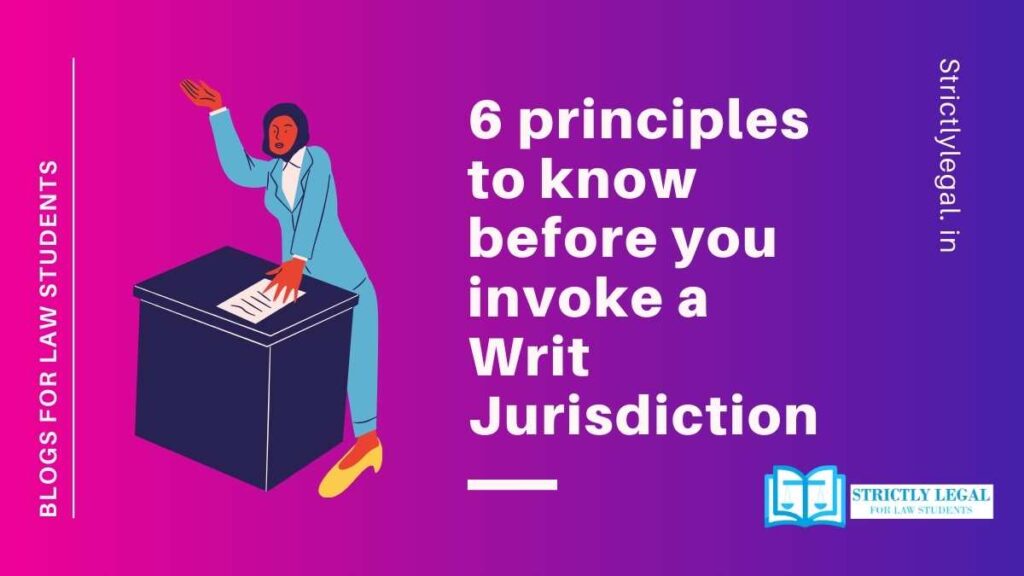The jurisdiction and procedural concepts can build your confidence, but reversed grasp at the fundamentals of writs and Supreme Court jurisdiction, civil and criminal procedure and principles of evidence is imperative to ensure that you are not caught off guard at the opening conversation.
We will discuss the theory and the Constitutional basis of the Writ jurisdiction in India. And in the latter part, we shall discuss the procedure for invoking writ jurisdiction.
There are two sources of Writ jurisdiction. The first is article 32 and the second is article 226.
Table of Contents
Can Writ jurisdiction be invoked for any case?
The straightaway answer is NO. Judicial interpretations over the years have played a major role in determining the contours of writ jurisdiction in practice, especially in the context of Article 226. The biggest reason for this is that Article 226 is phrased in rather a broad language, as it refers to fundamental rights and any other purpose. Not only that, but courts also have to clarify that any other purpose only referred to situations where a legal right existed. They also had to clarify that a jurisdiction is not a substitute for other dispute resolution procedures prescribed by law.
For instance, the code of civil procedure contemplates civil courts as the forum for filing suits and the Code of Criminal Procedure contemplates criminal courts as the forum for hearing criminal cases.
If any other purpose were interpreted literally and without any limitation, one could even argue that parties would be able to avail of the writ jurisdiction of High Court under Article 226 for such civil and criminal cases as well.
This would lead to chaos. High courts would be overburdened, hearings would be inefficient, and it would scarcely be possible to maintain any semblance of standardization of the judicial procedure. As a result, courts have evolved a number of legal norms and principles to decide when the exercise of writ jurisdiction is called for.
Principles of invoking writ jurisdiction
These are not established principles but only an indicative. The court may part away from them if the cases demand.
Discretion
The first principle is that the grant of relief under Article 226 and Article 32 is at the discretion of the courts. This may sound obvious, but the nuance is that although the right to approach the Supreme Court under Article 32 is a fundamental right, the right does not extend to having a right to be granted relief by the Supreme Court in each case of fundamental rights violated.
Similarly, the right to approach high courts under Article 226 of the constitution of India is a constitutional right. But the right does not extend to having the right to be granted relief by a high court. In each case, a fundamental or other legal right has been violated.
Grant of relief involves the exercise of discretion by judges and the rest of the principals we are concerned with are in essence, self-imposed judicial guidelines for the exercise of that discretion.
The alternate, equally efficacious remedy test
The second principle is that courts will generally not exercise jurisdiction in a case where the petitioner has an alternate, equally efficacious remedy at his or her disposal, as we saw earlier, this is based on the idea that the jurisdiction is not a substitute for other procedures provided by law for dispute resolution, such as criminal or civil trials. This is also the reason why courts may be averse to exercising jurisdiction in cases that involve disputed questions of fact
Let us take an example to understand this principle. Better say you want to build a shopping mall for which you enter into a contract with a Marble supplier to sell you marble for your shopping mall, and then you breach that contract by not paying the agreed sale price. The marble supplier could theoretically approach the high court under Article 226, claiming that it can invoke its jurisdiction under the head of any other purpose. It could also, of course, approach a civil court and file a civil suit seeking appropriate reliefs against you.
If the marble supplier approaches a high court under Article 226 in such circumstances, the high court is likely to dismiss its petition on the preliminary ground that an alternate, equally efficacious remedy is available. The marble supplier should exercise those remedies instead of invoking Article 226.
Let us take a another different example. The government wants to construct two new roads and for which it enters into a contract with the road construction contractor to do the job, and then the government breaches that contract by not paying the agreed contract price. The Contractor could theoretically approach the high court under Article 226, claiming that it can invoke its jurisdiction under the head of any other purpose. It could also, of course, approach a civil court and file a civil suit seeking appropriate reliefs against the government.
If the contractor approaches a high court under Article 226 in such circumstances, what is the high court likely to do? Is this situation distinct from the previous situation? You may wonder. A key point of distinction is that the defendant in a situation A is a private individual and the defendant in A situation, B is the government.
Even so, it is likely that if this course of action raised by the cement supplier is merely a breach of contract which can be agitated in a civil court, in a civil suit, the High Court would still apply the principle that the contractor must exercise that alternate equally efficacious remedy. Therefore, the mere fact that a claim is being made against the government does not mean that the High Court must exercise its jurisdiction.
However, in the same example, if a few additional facts are added, the approach of the high court may be different. Suppose the government plans to construct 10 new roads and as part of one project and 10 different contractors have been engaged one for each new road. The government pays the agreed contract price to nine out of 10 contractors in order to fulfill its contractual obligations.
But the government’s official in charge has a personal agenda against the 10th contractor because of which he has deliberately delayed payment to that contractor in such a situation to causes of action may arise from the same transaction.
One, of course, is a breach of contract for which remedy can be sought in a civil suit and in addition to that the contractor may allege a violation of a fundamental right. That is Article 14, which states that the state shall not deny to any person equality before the law. It may allege that its fundamental right under Article 14 has been violated because the government has unfairly discriminated against it by paying the nine other cement suppliers while withholding the amount due to it.
And therefore, the actions of the government are arbitrary and motivated. In this case, a civil court would not have jurisdiction to determine the question of violation of fundamental rights.
That is, it would not be an alternate, equally efficacious remedy as far as that course of action is concerned. Therefore, the High Court may be inclined to exercise its jurisdiction, possibly with the caveat that the contractor will restrict its arguments only to the cause of action based on the violation of its fundamental rights and not the cause of action based on the breach of contract.
Therefore, subject to the specific facts of a case rate, writ jurisdiction may be invoked against private parties as well if the nature of their activities calls for it. Let us summarize this part of our discussion in four propositions. First, a high court is not likely to invoke its writ jurisdiction for the adjudication of a dispute involving a violation of purely private interests for which one or more alternate, equally efficacious remedies exist in law. Second, this is the case even if the party that is alleged to be in the wrong is the state.
Third, a high court may invoke its jurisdiction for the adjudication of a dispute involving the violation of private rights. If, at the same time the dispute involves the violation of a fundamental right or the violation of a law for which no other remedy has been provided. This is often the case when the party that is alleged to be in the wrong is the state. And finally, a high court may invoke Article 226 against a private person if its activities are of a public nature or they otherwise fall within the parameters of the third proposition above.
Needless to say, these are general propositions, they may have exceptions, and courts in certain cases may go beyond these general propositions as well. A lot depends on the particular facts of a case and the feasibility of exercising an alternate remedy provided by law.
Judicial review of executive actions
A third principle relevant to the exercise of writ jurisdiction is about the scope of judicial review of executive action. When a court exercising writ jurisdiction reviews the correctness of a particular action, say the selection of a person by the government to a particular post, its role is not to substitute its own assessment for the government’s assessment, but to assess whether the government has acted rationally and not arbitrarily. That is whether the government has considered relevant factors and not considered any extraneous factors for its decision.
For instance, in the selection of a particular person for a particular post, has the government considered factors of skill or experience that have a rational nexus with the nature of the post? In other words, has the government considered what skills will be necessary for a person to effectively discharge the duties connected with the post? And has its decision been tainted by the consideration of extraneous factors such as gender or religion, as the case maybe?
In general, a judicial review of executive action is a review of the process by which the decision was made and not necessarily the specific outcome of that executive action. The question asked is whether the executive action can be described as reasonable and not whether it is exactly what the court or the judge would have chosen to do in that situation.
As the Wednesbury Principle states, the courts will not intervene to quash the decision of a statutory authority unless it can be shown that the authority of the law was guilty of a breach of natural justice or acted unreasonably. If the authority has considered the matters which it is its duty to consider and has excluded irrelevant matters, its decision is not reviewable unless so absurd that no reasonable authority could have reached it.
The principle excludes the court from substituting its own view of the facts for that of the authority. This principle has its basis in the doctrine of separation of powers, the judiciary is not superior to the executive, but it must ensure that the executive acts according to law. Of course, again, this principle is a general one. How far a court deems it fit to interfere in a particular case of judicial review of executive action may vary on the facts of the case.
Judicial review of legislative action
The fourth principle is about the judicial review of legislative action. That is when laws passed by law-making authorities are challenged by invoking Writ jurisdiction in such cases. The first aspect of the review is whether the legislation violates a fundamental right. Second, whether the legislation violates a constitutional right other than a fundamental right. And third, relevant in the case of delegated legislation such as the Bar Council of India rule, 1975, which have been made under the authority granted to the Bar Council of India by the Advocates Act. 1961 is whether the scope of the delegated legislation under review is ultra vires i.e whether it goes beyond the scope permitted of such delegated legislation by statute or otherwise.
In such cases, it is not sufficient that the lawmaking authority in good faith considered the legislation to be valid. In this sense, the judicial review of legislative action is different from the judicial review of executive action. The court must consider objectively, as a matter of legality and constitutionality, whether the legislation can be sustained.
The burden of proving that particular legislation is unconstitutional or ultravirus is a statute is on the person alleging it to be so. The legislation carries a rebuttable presumption of constitutionality or legality.
Writ Futility test
The fifth principle is that jurisdiction will not be invoked in futility. That is, if the grant of relief will be futile, though a violation of a right has been established, the court will not exercise its jurisdiction. For instance, if a student has been wrongly denied admission in a university in the year 2013 and the Student Files petition after, say, two years, the court declined to grant him any relief because the student is no longer in a position to join the university as part of the batch which commenced in 2013.
Residuary principle
The sixth principle, if it can be called one, is that the court may exercise jurisdiction in the interests of justice. It is difficult to contemplate all the possible situations that may arise in human affairs so the courts have a residuary bar, so to speak, of being able to invoke jurisdiction where they deem it to be in the interests of justice.
Other Major Factors
Apart from these six principles, there are three other major factors that courts consider relevant when they exercise their discretion for invoking Writ jurisdiction. The first factor is whether the person seeking to invoke Writ jurisdiction has clean hands. That is whether the petitioner has engaged in inequitable or illegal behavior.
If so, the court may not be inclined to grant relief after invoking jurisdiction, even if there is an arguable case on merits. The second factor is about the conduct of parties during Writ proceedings if the parties conduct during the proceedings is inequitable or illegal. The court may consider such conduct as relevant to the formulation of final reliefs in the matter.
The third factor is delay. That is whether the person seeking relief has acted diligently or whether there has been an inordinate delay on his or her part. In some cases, the excessive or unexplained delay can be a relevant factor for a court to decline the exercise of writ jurisdiction.
Nevertheless, there’s one more way
if the facts are against you, argue the law. If the law is against you, argue the facts. If both the law and the facts are against you. Pound the table and yell like hell.

A law student who has knowledge of numbers. A nerd who invests his ideas in new things.




